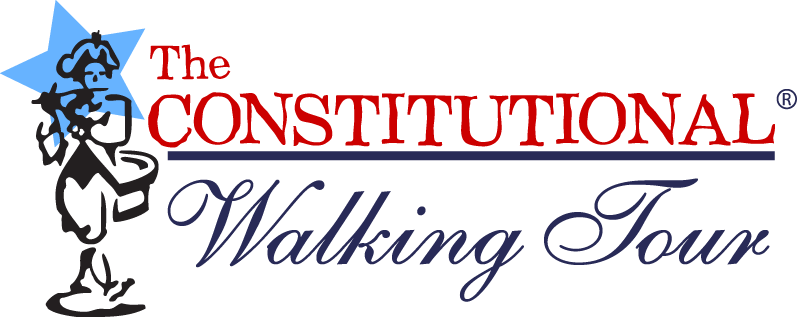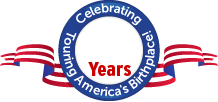Related Posts
- Buy Tickets for The Constitutional Walking Tour of Philadelphia – See 20+ Sites on a Primary Overview of Independence Park, including the Liberty Bell and Independence Hall
- Independence Hall
- Congress Hall
- The Declaration of Independence
- George Washington - One of America's Founding Fathers
- John Adams - One of America's Founding Fathers
- Remembering President John F. Kennedy Speaking at Independence Hall, July 4, 1962
- The President's House
- John Hancock - One of America's Founding Fathers
- Philadelphia's Fourth of July Celebrations
- Frommer's Names Independence Hall One of Their "Best Places 2021"
With Independence Hall as the Setting, President Woodrow Wilson celebrated Independence Day in America's Birthplace
On July 4, 1914, President Woodrow Wilson, the 28th President of the United States, celebrated America's Independence Day at Independence Hall, the site where The Declaration of Independence had been adopted on July 4th, 1776, America’s Birthday.

President Wilson's presence in Philadelphia was a major story within the city and his visit was the front page story of The Philadelphia Inquirer's July 5, 1914 edition as seen above. The Inquirer's front page headline declared "Nation's President For First Time Attends Local Celebration of Fourth."
However, according to the National Park Service, both of America's first two presidents, George Washington and John Adams, celebrated Independence Day in Philadelphia. Though to be fair, it had been more than a century since President Washington and President Adams celebrated the Fourth of July in Philadelphia. Additionally, the presence of both President Washington and President Adams in Philadelphia would have been far less notable in the 1790s since Philadelphia served as the Capital of the United States during that decade, and both Washington and Adams resided in Philadelphia at the President's House while they each served as President of the United States.
Wilson spoke both outside of Independence Hall, in Independence Square surrounded by a large crowd of civilians and those in the armed forces stationed in the Philadelphia area. Inside Independence Hall, President Wilson addressed a smaller crowd of reporters and dignitaries. In Wilson's speech, he talked of The Declaration of Independence, signed in Independence Hall, which stood behind him as spoke and related the words of this country's founders to the challenges of 1914. Wilson spoke on the Mexican Civil War which had led to great property loss in Mexico and some Americans advocated for American military intervention to protect American Business interests. But according to The Philadelphia Inquirer, Wilson remarked that while he was sympathetic to all of those who had lost property in the conflict, his thoughts were with the struggling people of Mexico and reminded those in attendance to "not forget that any awakened people can govern and control their own affairs."
In light of the words of The Declaration of Independence, Wilson stated that "the United States guaranteed freedom and justice to all, and it could not at this late day violate the sacred pledge made in the Nation's youth." Speaking to those would wished for the United States to intervene in Mexico, Wilson remarked:
"I would be ashamed of our flag, the emblem of freedom and of liberty, if it was used for anything outside this country that we would not permit it to be used for within the United States. When the people of this country know and fully appreciate what is at stake in Mexico, they they will know what should be done there."
Philadelphia's Fourth of July Celebration made news outside of Philadelphia as well, since Wilson's speech became a national news story. In the July 5, 1914 edition of The Baltimore Sun, Wilson's visit to Philadelphia was the lead story, and his speech was covered extensively. The Sun's headline exclaimed that "Wilson Thrills Crowd" with a speech that frequently delved into America's history while dedicating much of his time to speak to the nation's future.
It was noted that President Wilson, in the Assembly Room of Independence Hall, sat in the chair once used by John Hancock, that the ice water he drank from as he spoke was contained in a pitcher used by George Washington, and when Wilson pounded on the table in front of him to make a point, that table was none other than the table on which The Declaration of Independence was signed.
But amongst these historic relics, much of Wilson's speech focussed on the future of the United States since Wilson spoke on the need to modernize The Declaration of Independence:
"Liberty does not consist in mere general declarations as to the rights of man. It consists in the translation of those declarations into definite action. Therefore, standing here where the Declaration was adopted, reading its businesslike sentences, we ought to ask ourselves, 'What is in there for us?'
There is nothing in it for us unless we can translate it into terms of our own condition and of our own lives. We must reduce it to what the lawyers call a bill of particulars. It contains a bill of particulars - the bill of particulars of 1776 - and, if we are to revitalize it, we are to fill it with a bill of particulars of 1914.
The task to which we have to address ourselves is a proof that we are worthy of the men who drew this great declaration by showing we know what they would have done in our circumstances."

Beside The Baltimore Sun's article on President Woodrow Wilson's visit to Philadelphia is an interesting photo, which is pictured above. While it identifies the building as Independence Hall, the building in which Wilson spoke, the building is, in fact, Congress Hall, which is located next to Independence Hall. This error is, however, a bit of a happy accident, because there are many pictures of Independence Hall all throughout its history due to the incredible significance of the building. While a significant building in its own right because it housed the United States Congress from 1790-1800, Congress Hall had been much less extensively photographed than its more famous neighbor. Therefore, this photo allows us catch of glimpse of Congress Hall in 1914, looking very much like it does today.
Wilson's Visit Today
Independence Hall, where President Wilson gave his speech, is a key stop on The Constitutional Walking Tour of Philadelphia! Congress Hall, the former home of the Congress which was featured in The Baltimore Sun article mentioned above, is also a stop on The Constitutional. We look forward to welcoming you to Philadelphia so you can step back in time and walk in the Founding Fathers' footsteps as well as President Wilson's footsteps by taking The Constitutional.



